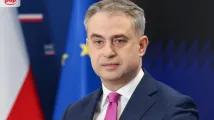Profil:
Orlen SACentral European Petroleum seeks partners for oil and gas extraction from Wolin well, invites Polish firms (interview)
Following the discovery of the largest hydrocarbon deposit in Poland, Canadian-originated company Central European Petroleum (CEP) is beginning to search for Polish and international partners for oil and gas extraction from the Wolin well, CEP's CEO Rolf Skaar told PAP Biznes. He has already discussed cooperation with the Polish natgas group PGNiG, among others.
CEP announced on Monday that it had made a major oil discovery at the Wolin East 1 (WE1) well in the Baltic Sea, approximately 6 kilometres from Swinoujscie.
According to the company, The Wolin East deposit is estimated to contain 22 million tonnes of recoverable hydrocarbons in the form of crude oil and condensate, and 5 billion cubic metres of commercial-quality gas.
The total resources of the Wolin concession are estimated to exceed 33 million tonnes of recoverable crude oil and condensate and 27 billion cubic metres of commercial-quality gas.
According to CEP's CEO Rolf Skaar, the Wolin East oil and natural gas field is the largest conventional hydrocarbon deposit discovered to date in Poland and one of the largest conventional oil deposits discovered in Europe in the last decade.
"We have made a very large oil discovery in the eastern region of Wolin, confirmed by drilling. This deposit is the largest oil discovery in Europe in the last 10 years," the CEO of Central European Petroleum Rolf Skaar told an interview with PAP Biznes.
"One of the largest deposits in Poland – Barnowko–Mostno–Buszewo - contains approximately 400–500 million barrels of oil, with a recovery rate of approximately 25 percent, which gives an estimated 100 million barrels that can be extracted. In our case, we are talking about a deposit of the same size, if not larger, than BMB," he added.
Poland's oil demand is approximately 700,000 barrels per day. Domestic production provides only about 16,000-18,000 barrels per day, and 95 percent of oil is imported.
"When we start production, we will double – and perhaps triple – daily oil production in Poland. This will have a significant impact on domestic oil production and will be very beneficial for Poland's energy security," said the CEO of Central European Petroleum.
"Once production begins, we will also increase domestic gas production by about 20 percent. We have recently confirmed estimates of 16.5 billion cubic metres of gas," he added.
Rolf Skaar announced that Central European Petroleum will begin searching for partners to extract oil and gas from the Wolin concession, pointing out that he would be happy to cooperate with Polish companies.
"We are open to finding partners. We will talk to the largest Polish and international companies involved in exploration and production so that they can familiarise themselves with the project and join us – so that we can move on to oil and gas production as soon as possible," Skaar said.
"We have already talked to partners, and they told us: 'drill the well, and if you find something, then we'll talk'. So, we know of at least ten companies interested in talks after the discovery," he added.
According to the CEO, international investors and large energy companies may also be interested.
He stressed that he is open to talks with any Polish company that wants to cooperate. He also noted that the last meeting with PGNiG regarding the Wolin concession took place in 2023.
"The technical team from the former PGNiG and Lotos are world-renowned experts in the field of geology. We appreciate their strength, knowledge and competence and want to cooperate with them. They have experience in all currently exploited deposits in Poland, while we have extensive know-how from Canada and Norway. We have seen how it works there," CEO Skaar said.
"We invited people from PGNiG to talks. We presented a full technical assessment of the discovery. They liked it very much. However, the topic was then put on hold due to the merger of PGNiG with Orlen – the management had other priorities at the time. Nevertheless, we have a very good relationship with the Polish company," he added.
When asked what share of the project he would be willing to give to a potential partner, Rolf Skaar replied that no decision had been made yet, but he did not rule out selling up to 100 percent of the shares.
"We own 100 percent of the shares, so we have full flexibility. We can sell everything, a small part or a majority stake. It depends on what the market wants, what offers we receive and what our shareholders decide," he said.
Rolf Skaar pointed out that at this stage it is still difficult to accurately estimate the costs associated with oil and gas extraction from the field. So far, the expenses have amounted to approximately PLN 200 million (EUR 47 mln), but this is only the beginning of the investment needs, which may reach billions of zlotys.
"We have spent almost PLN 200 million on seismic surveys and drilling. In the next few weeks, we will know the costs of production drilling. These are large amounts. But our shareholders were willing to take this risk because we believed that the potential benefits were very attractive," said the CEO of Central European Petroleum.
There are no project development costs yet, but Rolf Skaar is convinced that the cost of extracting oil and gas from the Wolin concession will be lower than purchasing these raw materials, for example from oil fields in Norway.
"If you drill in the North Sea and transport oil to Poland via pipelines, the Wolin deposit will obviously be cheaper because, first of all, it is closer to the market and, secondly, it is an area with a depth of only nine metres. Technologically, extraction here is much simpler and cheaper than in Norway, where the depth is 100–200 metres and the conditions are much more difficult," he said.
Skaar noted that he would like to start oil and gas extraction from the Wolin concession as soon as possible.
"We are currently submitting geological documentation, followed by investment documentation. Once they have been submitted and approved by the Polish authorities, we will apply for a production licence, and once we have obtained it, we can start," he said.
Rolf Skaar said that one of the options being considered is to carry out the entire investment in the Baltic Sea area to minimise the impact on the environment. He emphasised that the necessary infrastructure for transporting gas and oil already exists.
"The infrastructure is in place. Therefore, when we analysed this licence, we found it to be a very interesting location – we believe that the geology here is excellent and the deposit is located right next to the infrastructure," he said.
"We can build a very small platform and conduct offshore oil extraction, and then transport it by ship to any terminal, e.g. to the oil terminal in Gdansk. Therefore, the Polish authorities do not need to invest in any infrastructure," he added.
Rolf Skaar pointed out that LNG can be delivered to Poland, but traders can also direct it to global markets.
"However, it would be more reasonable to introduce it into the Polish gas system – why import LNG from Qatar or the US when we have our own resources?" he said.
Poland changed its concession procedures in 2016 to encourage foreign companies. Central European Petroleum accepted the invitation.
"We decided to drill 100 percent with our own funds and to take on all the risk because we believed there was a high probability of finding a good quality deposit," said Rolf Skaar.
"We completed the exploration work in February this year. We expected to find gas, but we also found oil – which we were quietly hoping for because we knew there was oil near our licence," he added.
There is also significant exploration and appraisal potential within the licence area, both in the main dolomite geological formation and in the deeper red mudstone formation.
According to Rolf Skaar, finding oil or gas in one licence area may be a sign that there are other deposits in the vicinity.
"We have an oil and gas field, and this opens up completely new opportunities for Poland, because there are probably other resources there – this is normal in a geological basin. It was the same in the North Sea – although drilling has been going on there for 50 years, new discoveries are still being made," he said.
At the end of February, Central European Petroleum completed drilling its first well, Wolin East 1 (WE1), on the Wolin concession. At the time, the company assessed the preliminary results obtained during drilling as "encouraging".
The Wolin concession covers an area of 593 square kilometres and was granted by the MinistrY of Climate and Environment (MKiS). CEP is exploring for hydrocarbons in the main dolomite (Ca2) and Rotliegend deposits.
As part of the WE1 project, CEP carried out drilling, core sampling, geophysical profiling and reservoir testing in the Ca2 main dolomite reservoir.
Data collected prior to drilling suggested that the Ca2 main dolomite deposit may contain up to 16.5 billion cubic metres of recoverable gas and 10.3 million cubic metres of recoverable liquids.
Central European Petroleum Ltd is a Canadian company based in Calgary, engaged in the exploration and production of hydrocarbons, majority-owned by Norwegian investors.
Its subsidiary, CEP Central European Petroleum, holds the Wolin licence in north-western Poland and acts as the operator of this licence.
pr/ han/ ao/



